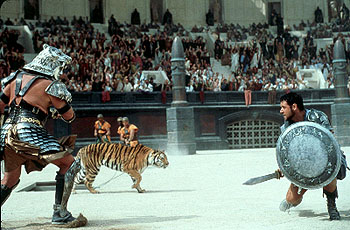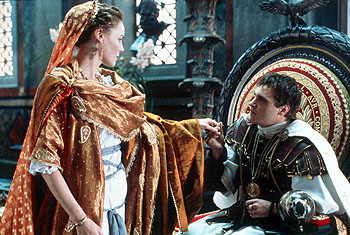

Gladiator officially kicks off the summer 2000 movie battle in an intense way. The film is flashy, violent, and spectacular, everything a summer movie needs to be. Of course, the story takes its cues from historical events, but the large part of Gladiator is fiction, and does not pretend to be anything else. Gladiator is a movie where the viewer can shut down his/her mind and let the sensory overload take over, all the way to the end of the film.
The story tracks the tale of Maximus (Russell Crowe, The Insider, Mystery, Alaska), who must win in the end because he has such a cool name. Maximus is the favored general of Marcus Aurelius (Richard Harris, This is the Sea, Smilla's Sense of Snow), who wishes to leave him in charge of Rome before the Senate can once again rule. Aurelius' son, Commodus (Joaquin Phoenix, 8MM, Clay Pigeons), a power-hungry, brash, immature ruler, wishes otherwise, and murders his father and attempts to murder Maximus (Marcus Aurelius and Commodus are actual historical figures). Maximus subsequently escapes and lands in the hands of slavers. Proximo (the late Oliver Reed, Marco Polo, Parting Shots), a former gladiator. Proximo trains Maximus as a gladiator, and brings him to Rome, where Commodus reinstated the games. Maximus sets out to win the games and exact his revenge on Commodus.
Crowe, the ever changing actor, now morphs believably into action hero. His intense stare and gravelly voice lend credence to all his threats in the movie. Phoenix also glares his way into madness in an over the top performance that borders on cheesy. Connie Nielsen (Mission to Mars, Rushmore) plays Lucilla, Commodus' sister and friend of Maximus. Lucilla plots with Senator Gracchus (Derek Jacobi, Up at the Villa, The Body) to free Maximus and overthrow Commodus. However, most of the intrigue takes a second seat to the arena battles. All of the matches are excellently choreographed, violent, and bloody. Contests vie against tigers, chariots, archers, and other gladiators with swords, spears, tridents, and nets. The viewers feel what Maximus does when the doors open and the deafening roar of the crowd blasts out of the speakers. Hans Zimmer, probably one of the better composers of action-oriented film scores (like Crimson Tide or The Rock) teams with Lisa Gerrard (The Insider) to create a loud score that easily complements the tone of the film.
The story by David Franzoni (Amistad), John Logan (Any Given Sunday) and William Nicholson (Shadowlands) effectively mixes drama with dazzling action, but is overly long. The movie begins with Maximus leading a battle in Germania, an astounding sequence with seemingly thousands of people in battle and then abruptly slows down to a crawl. The action picks up only after Maximus arrives in Rome. Director Ridley Scott, the man behind such films as Alien and Blade Runner, uses CGI to create Rome in all its glory. The Colosseum appears, unbroken, and full of cheering spectators. Most of the large shots show the crowd from a distance, so the CGI characters do not look too fake. Costumes and sets are beautifully detailed, from Maximus' tents and Commodus' opulent living quarters to the dusty slave pens of Proximo. Once the movie ends, audiences can turn their brains back on and take away with them the only memorable moments of Gladiator, Russell Crowe in battle against a variety of foes.